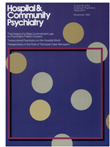An Assessment Program to Reduce Drug Use With the Mentally Retarded
Abstract
Growing concern over possible institutional drug abuse has made it extremely important to identify procedures to systematically evaluate the therapeutic effectiveness of drugs. The authors describe a two-phase drug assessment program that has permitted an intermediate care facility for the mentally retarded to reduce its reliance on psychoactive medication and to meet the mandates of accreditation and law. The first phase identified individuals who could effectively participate in treatment without medication. The second phase identified minimum effective dosages for those whose maladaptive behavior could not be controlled when medication was abruptly removed. Therapeutic benefits resulting from this individualized drug reduction program are discussed, as are the economic and programmatic benefits to the institution.
Access content
To read the fulltext, please use one of the options below to sign in or purchase access.- Personal login
- Institutional Login
- Sign in via OpenAthens
- Register for access
-
Please login/register if you wish to pair your device and check access availability.
Not a subscriber?
PsychiatryOnline subscription options offer access to the DSM-5 library, books, journals, CME, and patient resources. This all-in-one virtual library provides psychiatrists and mental health professionals with key resources for diagnosis, treatment, research, and professional development.
Need more help? PsychiatryOnline Customer Service may be reached by emailing [email protected] or by calling 800-368-5777 (in the U.S.) or 703-907-7322 (outside the U.S.).



